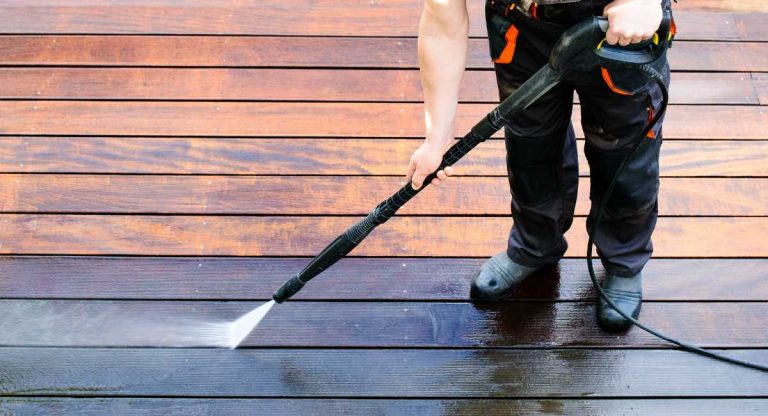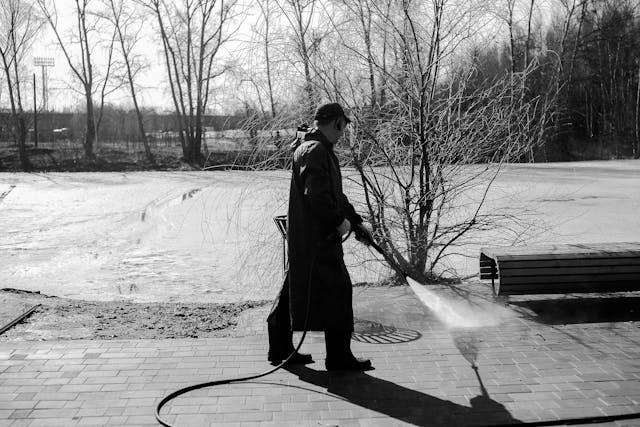
If you manage a multi-unit property — whether it’s a duplex, apartment building, townhome complex, or a row of commercial spaces — maintaining curb appeal and cleanliness isn’t just about aesthetics. It’s about tenant satisfaction, long-term property value, and community standards. 🧼🏘️
But not every power washing company is equipped to handle large or multi-unit jobs. From logistics to equipment to scheduling, these projects require a different skill set than the average residential clean.
Here’s what you need to know when searching for a power washing company that specializes in multi-unit properties — and how to choose one that gets the job done right. ✅💦
🧱 What Makes Multi-Unit Power Washing Unique?
Cleaning multiple units isn’t just a larger version of a house wash. It involves:
- Multiple entry points, shared walls, or rooflines
- Common areas like sidewalks, fences, or parking lots
- Tenant communication and access coordination
- Larger square footage and more complex surfaces
- Tight timelines or staged cleaning over several days
In other words, you need a team that understands how to operate efficiently at scale — without disrupting residents or businesses. 🛠️🏢
🔍 Step 1: Search for Commercial-Grade Providers
Start by narrowing your search to companies that list:
- Apartment complexes
- Townhome developments
- Commercial buildings
- HOAs and property management firms
on their websites or service pages.
Look for terms like:
- “Multi-family cleaning”
- “Commercial power washing”
- “HOA exterior cleaning”
- “Large property exterior services”
If a company doesn’t mention this type of work, they may not be equipped to handle it. 🤷♂️
🛠️ Step 2: Ask About Equipment and Capacity
Multi-unit projects require:
- High-GPM pressure washers (for faster rinsing)
- Water reclaim or filtration systems (for eco compliance)
- Telescoping poles or boom lifts (for higher buildings)
- Large water tanks for properties without external water hookups
Ask the contractor:
- “What kind of equipment do you use for multi-unit jobs?”
- “How many technicians will be on site?”
- “Can you handle multiple buildings in one day?”
- “Do you bring your own water source if needed?”
Their answers will tell you whether they’re truly built for scale. 🚚🧽
Browse Amazon Here For Commercial Pressure Washers And Accessories
📞 Step 3: Get Clear on Communication and Scheduling
Coordinating with dozens of residents, tenants, or business owners requires a pro who’s:
- Organized
- Communicative
- Respectful of noise and timing concerns
A qualified company will help you:
- Notify residents in advance
- Set up phased scheduling (e.g., Building A on Monday, Building B on Tuesday)
- Minimize disruption during business hours
- Provide detailed timelines and points of contact
This type of professionalism is critical — especially when cleaning entrances, stairwells, or shared walkways. 📅📣
📄 Step 4: Confirm Licensing, Insurance, and Compliance
You absolutely want a company that is:
- ✅ Fully licensed
- ✅ Insured (including commercial liability and workers’ comp)
- ✅ OSHA-compliant (for high-access areas)
- ✅ Familiar with local runoff and environmental laws
If someone slips during cleaning or damage occurs to a tenant’s window or property, you need to be legally and financially protected.
Ask to see:
- A copy of their insurance certificate
- Examples of previous large-scale jobs
- A written contract or proposal detailing scope and cost
Don’t settle for vague promises — get it all in writing. ✍️🛡️
📸 Step 5: Ask for Before-and-After Photos
Experienced multi-unit cleaners will often have:
- A portfolio of similar projects
- Visuals of before-and-after results
- Testimonials from property managers or HOA presidents
These case studies help you evaluate the quality of their work — and how well they cleaned similar materials like brick, stucco, siding, or walkways.
If they can’t provide photos or references, it’s a red flag. 🚩📷
💡 Bonus Tips for Hiring the Right Team
To get the best results:
- Ask for a bundled quote – Sidewalks, siding, garages, and gutters may cost less when combined.
- Schedule during off-peak hours – Cleaning early in the week or in the mornings may reduce foot traffic and resident complaints.
- Request a maintenance plan – Some companies offer quarterly or bi-annual cleanings at a discount.
- Don’t go for the lowest bid – It usually reflects in the quality and professionalism.
💬 What to Ask During the Interview
Here are key questions to ask when vetting a power washing company for multi-unit work:
- “Do you have experience working with HOAs or property managers?”
- “What types of buildings do you normally service?”
- “Can you provide references from other multi-unit jobs?”
- “How do you coordinate with multiple residents or tenants?”
- “Do you use soft washing or high-pressure systems for different surfaces?”
- “How do you handle water runoff or eco compliance in urban settings?”
Their answers should be detailed, confident, and backed by experience. 🧠✅
🏁 Final Thoughts
Maintaining a clean and professional appearance across a multi-unit property isn’t just about looks — it’s about long-term value, resident satisfaction, and health. Mold, grime, algae, and buildup can lead to damage and complaints if not handled proactively. 🏘️💬
By hiring a power washing service that specializes in multi-unit properties, you gain:
- Efficient service at scale
- Equipment suited for larger or elevated surfaces
- Professional communication and scheduling
- Compliance with insurance and safety protocols
- Results that tenants and owners will actually notice
In short — don’t hire a one-house-at-a-time cleaner for a complex job. Go with a pro that knows how to clean the big stuff. 💪🚿
Browse Amazon Here For Commercial Pressure Washers And Accessories






